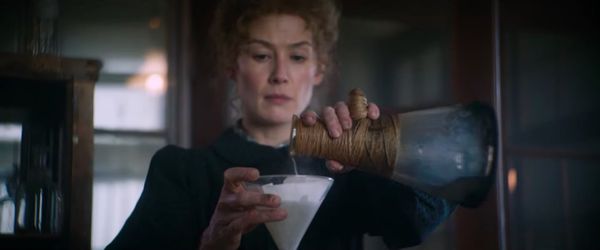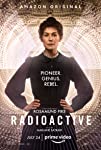Eye For Film >> Movies >> Radioactive (2019) Film Review
Radioactive
Reviewed by: Andrew Robertson

Radioactive, or at least the graphic novel from which it is drawn, glows in the dark. The cover, that is, a fact I discovered when I ventured into my hall the other night. I would say "my copy" but it is on loan from a library, indefinitely, due to the precautions taken by Glasgow City Council over Covid-19. That something unseen could cause such disruption is dramatically ironic, but throughout Radioactive a similar glow is dramatic irony. We the audience, and the Curies too, both know that radiation will change the world. They just don't yet know how much it will change them.
To be glib, it has perhaps not been since Predator 2 that the luminescence of glow-sticks has had such an important role in a film. To be less so, the way that Rosamund Pike's Curie cradles that soft green glow has a magic to it, one reflected in the ways that Marjan Satrapi's film draws experimentally, experientially, from Lauren Redniss' graphic work. While it finds much of the same mystery and revelation through doors and flashes (back and fission), it does lose some of the weight. Curie was born Sklodowska, though the cast have a much easier time pronouncing the former than the latter, and the book includes a gallery of Polish greats in tribute to her achievement.

How and why France would dispute and then reclaim her forms part of the meat of the film, and while Marie is the nucleus in her orbit are all manner of charming and charged encounters. Pike is no stranger to biopics, she was not too long ago Marie Colvin in A Private War. As Pierre, Sam Riley also has form in the genre (Control) and there's genuine chemistry between the couple. As Paul Langevin, Aneurin Barnard continues in a vein of "historic and problematic third wheel" started as Darnley in Mary Queen of Scots. The source work delves into deeper detail into the hypocrisy of controversy over Marie's personal life, but the film foregrounds parts of that conflict by having Curie explain to Mme Langevin (Katherine Parkinson) the principals of radioactivity.
At that conventional scene at a dinner table, the film makes one of its first forays into the same unconventional territory as the source. There will be later digressions, doors not taken, from melting mannequins to wards of wounded, but these are minor reactions at first, until a certain critical mass is reached.
Satrapi is no stranger to graphic novels, Persepolis, her debut, was adapted from her own. Here she directs, co-writes with TV veteran Jack Thorne, though he's no stranger to French scientific spectacle as The Aeronauts was also from his pen. There are some striking moments - a clear day in 1945, a dark night in '86, crystals here with the same depths as uncut gems, salamanders holding secrets as deep as any dragon, and lots of detail.
Costume is a constant in period pieces, but convincing ageing (and wound) make-up add to the historicity. There are always likely to be budgetary constraints, Paris is never cheap and Paris of any era not now is more expensive. Throw in other locations from Nippon to Nevada, Ukraine and universities, and they become more so. A further challenge is the credibility of the chemistry - it's in two senses that a flame flickers between the Curies, and in both it convinces. There's a scene later lit with a convincing rendition of Cherenkov blue, no colour out of space held half as much horror as behind the door of Reactor 4. Light is important, because while I would not go so far as to say that Radioactive was brilliant, it does burn brightly, and warm.
Reviewed on: 03 Jul 2020

















